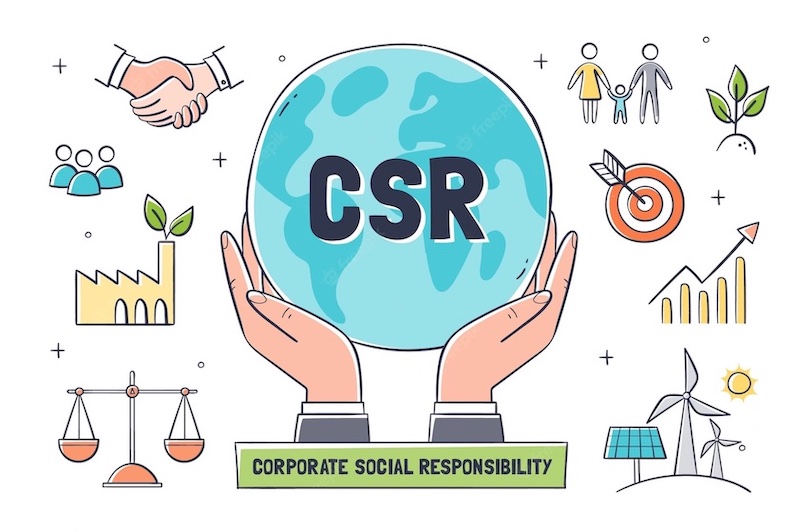Corporate Social Responsibility (CSR) has undergone a remarkable evolution, transforming from a mere token of philanthropy to a strategic imperative that businesses embrace to create a positive impact on society and foster sustainable growth. In today’s interconnected world, stakeholders such as customers, employees, and investors desire more from businesses. They want organizations to contribute to social and environmental well-being in addition to profit. This is where CSR comes into play. It provides a framework for companies to meet these expectations by incorporating social and environmental concerns into their operations.
Gone are the days when CSR was viewed solely as philanthropy or token gestures of goodwill. In the modern world, with an emphasis on key areas like education, sustainability, diversity and inclusion, social entrepreneurship, and technological innovation, CSR initiatives have become more focused, measurable, and effective. These initiatives alter the business landscape and pave the way for a more sustainable future. In addition, they cover everything from environmental responsibility to social impact, ethical business practices, employee engagement, and leveraging technology for social benefit.
Here’s a look at some of the transformative power of CSR and highlights impactful initiatives that are driving positive change.
Environmental Responsibility
With companies actively promoting sustainability, environmental responsibility is a key component of CSR. Organizations can minimize waste, lower energy usage, and encourage environmental initiatives using sustainable business practices. Additionally, they can lessen their environmental impact by using green technologies, incorporating renewable energy sources, and managing their resources responsibly. Therefore, by placing a high priority on the environment, businesses not only aid in the preservation of ecosystems and natural resources, but they also serve as a role model to others, encouraging them to embrace sustainable practices and work towards a greener future.
Social Impact
Due to the fact that businesses are aware of their responsibility in strengthening communities and bringing about positive change, social impact is the primary focus of CSR. Companies that are committed to social impact work to tear down barriers, empower people, and create stronger, more resilient communities. Through initiatives that tackle poverty, education, healthcare, and inclusion, businesses can change the world. They work with local organizations, providing resources and marginalized people opportunities. Moreover, by investing in education, healthcare, and community development, businesses uplift communities, foster social mobility, and create a more inclusive society.
Ethical Business Practices
Ethical business practices are a cornerstone of CSR, as companies strive to promote transparency, integrity, and fairness in their operations. Organizations build trust with stakeholders by establishing strong governance frameworks, abiding by high ethical standards, and upholding ethical business practices. They prioritize ensuring that workers are treated fairly, managing the supply chain ethically, and fighting corruption. Through transparent reporting, accountability, and responsible business practices, companies ensure their sustainability and reputation while also contributing to the development of a culture of trust, fairness, and integrity in the business community.
Employee Engagement
As organizations realize the value of establishing a culture of purpose within their workforce, employee engagement is a crucial component of CSR. Employers actively involve their employees in projects, volunteer programs, and social impact activities. Businesses improve job satisfaction, recruit top talent, and foster a sense of pride and loyalty by giving employees a chance to contribute to worthwhile causes. Engaged employees contribute to the business’ CSR initiatives, bringing about positive change inside and outside the company and leaving a lasting impression on the communities they support.
Leveraging Technology for Social Good
Technology is a key enabler of innovation, essential for effective CSR initiatives. Businesses are making better use of technological developments like artificial intelligence, blockchain, and data analytics to tackle societal issues. They use technology for social good in various ways, such as applying AI-powered algorithms to optimize resource allocation during natural disasters or implementing blockchain technology to increase supply chain transparency. Furthermore, companies can use innovation to their advantage by developing scalable solutions, streamlining procedures, and maximizing their influence. This leads to positive change and a noticeable improvement in the communities they serve.
CSR: Future Outlook
Corporate Social Responsibility (CSR) has a bright future since companies now understand how crucial it is to incorporate ethical behaviour into their core initiatives. The following are some major developments and trends that will affect CSR going forward:
Purpose-Driven Businesses: Businesses with a clear purpose, a goal, and a set of values that align with societal and environmental concerns are where CSR is going in the future. A growing number of businesses are embracing the notion that they have a responsibility that extends beyond maximizing profits and are incorporating social and environmental factors into their business plans. Thus, by adopting purpose-driven business strategies, organizations can be both financially successful and beneficial to society.
Collaborative Partnerships: The future of CSR will witness increased collaboration among businesses, governments, and communities. Companies collaborate with numerous stakeholders to create a collective impact because they recognize the complexity of social and environmental concerns. This collaboration enables the pooling of resources, knowledge, and networks to address serious issues like climate change, poverty, and inequality. In addition, it allows for the exchange of best practices and the creation of creative solutions that can bring about long-lasting change on a bigger scale.
Stakeholder Engagement: In the future, effective CSR will necessitate real stakeholder engagement. Businesses realize the value of being aware of and meeting the requirements and expectations of their various stakeholders, which include consumers, employees, investors, and local communities. Transparent and ongoing conversation with stakeholders fosters confidence, assures responsibility, and allows businesses to address significant concerns and objectives in ways that are consistent with their social and environmental impact goals.
CSR: Shaping a Better World
In today’s changing economy, CSR has evolved from a peripheral idea to a strategic enterprise requirement. Companies can use CSR to achieve good change and create a sustainable future by embracing environmental responsibility, social impact, ethical business practices, employee engagement, and technological innovation. Looking ahead, purpose-driven enterprises, collaborative collaborations, and stakeholder involvement will be the future of CSR.
Views of the author are personal and do not necessarily represent the website’s views.


